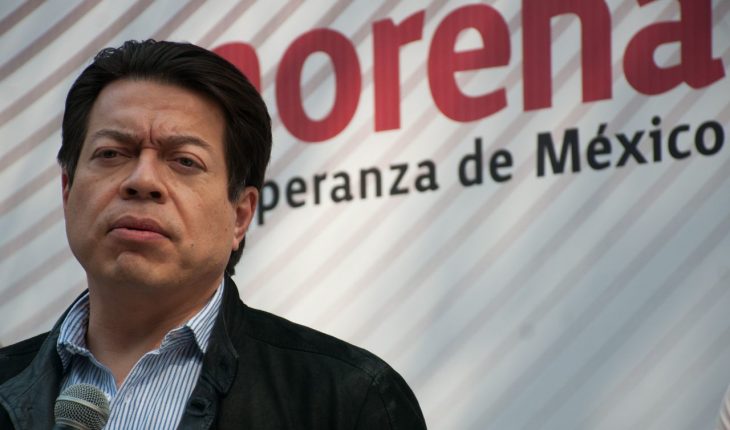After submitting 14 survey results for the 15 government candidacies, Morena faced questions that were born from her own trenches. Aspiring Guerrero, Colima, Nuevo León, Zacatecas, Chihuahua and Michoacán have questioned and demanded transparency in the survey process.
In the face of questioning, the President of the Republic denied having some kind of affiliation to the candidate selection process: “We do not get into the internal processes of the parties or to support any candidate or any party.”
Read more Morena defines contenders for Guerrero, Michoacán and Sinaloa: Félix Salgado and Raúl Morón, and Rubén Rocha
The election of candidates for state governments also ignited a confrontation between the political group led by Gabriel García, coordinator of Integral Development Programs of the federal government, and the group of Ricardo Monreal, parliamentary coordinator in the Senate, before the number of candidates selected from each side.
However, Morena’s leadership defended the use of surveys as an effective form of choice. Even through an advertising spot, polls were called “the best antidote to friendliness, influence and sectarianism.” This method was proposed by the same president, Andrés Manuel López Obrador.
Also, on December 3rd Mario Delgado, national president of the party, stated that all the candidates had signed a document in which they pledged to have “a fraternal treatment and not to resort to dismay in this process (that of the polls)”.
But that did not stop candidates who lost in their respective entities to rise up and vociferous their nonconformities, as well as impositions, “dark processes”, and even fraud within the selection methodology.
This is how clashes and signs unfolded in the various states:
Warrior
One of the most recent cases is Guerrero, an entity in which only last Wednesday Mario Delgado announced that Senator Félix Salgado Macedonio had been elected in the polls.
Against this, another of the candidates, Pablo Amílcar Sandoval Ballesteros, who is the brother of the Secretary of Public Service, Irma Eréndira Sandoval, was one of the first to stand up and ask for clarification of the methodology of the surveys.
Through his social media, Sandoval wrote, “We have informed our colleagues that we will ask to transparent the method used for candidate selection, we will exhaust all instances of our party to clarify the process.”
The dissatisfence with the choice of candidate was also externalized by driver John M. Ackerman, brother-in-law of Pablo Amílcar Sandoval, who called Félix Salgado “a dark character with a series of formal allegations against him for rape and gender-based violence.”
You may be interested: Three super delegates campaign with spectaculars; experts claim it’s illegal
In his column of La Jornada, he reported an inconsistency in the announcement of the selected candidate, which was postponed for two weeks. The starting date for the winner was December 17, the day Sandoval would win, the driver said; however, “surprisingly and last-minute Delgado leaned back in the face of threats from the losing team. Two weeks later, the result changed magically and Salgado was designated the party’s standard-bearer.”
“The conduct of the surveys has been marked by the absolute opacity. There is no official information regarding the methodology used and the results have not been made public,” Ackerman said.
Previously, the one on the maverick side was Felix Salgado, who accused the national leadership of favoring Amílcar Sandoval and seeking his imposition.
“In Morena NO MENTIR, it is one of its greatest postulates. The survey was won by the street with 80 points out of 40, from fifth place they intend to win. I’m still in Brunette, I’m not leaving, and I’m going to win all the polls they send to do. There is no imposition or denation here,” he wrote through his social media.
In the face of this conflict, another of the aspirants, former senator Luis Walton, proposed to integrate the “State Commission for Conciliation and the Unity of Morena’s Aspirants” in order to monitor compliance with the applicants’ agreements with Mario Delgado. This initiative was not carried out.
Colima
In the case of the colima government, federal Deputy Claudia Yáñez, who aspired to the candidacy of the entity, renounced her militancy in Morena after losing to the former federal delegate of Welfare Programs in the entity, Indira Vizcaíno Silva.
In his mission of resignation cited “dark interests and quota agreements” in the internal election process. She had previously appointed the chosen applicant to use federal program coordination to build her candidacy.
In the same resignation letter, addressed to Mario Delgado, he accused him of offending his “citizen dignity” to the extent that it was “impossible for him to continue to join that party, in which the political-electoral rights of his militants are unfairly and oprobbly abused.”
Chihuahua
Following the appointment of former federal delegate Juan Carlos Loera to the candidacy, The Morenist Senator Cruz Pérez Cuéllar announced that he would challenge the process before the Electoral Court and request that the poll be repeated.
It also requested that Morena’s national leadership explain with transparency and clarity the parameters to be measured, as well as the methodology of the pre-conduct surveys, so as not to fall to uncertainty like the one that happened on the first lap.
Days later, the senator accused Gabriel García Fernández, coordinator of the federal delegates of the government of López Obrador, of “being directly responsible for the manipulation of the process of selection of candidates in the interior”, and even of “spooning” the surveys for the selection of candidates.
New Lion
In Nuevo León the tides are no more calm, since the victory of the mayor of the municipality of Escobedo, Clara Luz Flores, did not like the morenist militancy, which pointed her out as someone who has been in the party for a short time.
The delegate was in the Institutional Revolutionary Party (PRI) for 20 years and resigned only on February 10. Soon after, he joined Morena and decided to register with the National Election Commission to participate in the polls.
Zacatecas
On September 19, Mario Delgado announced David Monreal’s candidacy for the state. It was reported that the surveys had been done by telephone in December, and Monreal had obtained 36.25 percent of the preferences, followed by Senator José Narro.
In the face of the news, two things happened: Narro took his nonconformity to social media, noting that he would challenge the results of the survey, and in a video he noted that irregularities had been found in the survey.
We found numerous irregularities in the poll with which last day david Monreal triumphed. We believe that there are options to really have a transparent internal process, according to the wishes of militancy.https://t.co/SIdiVjDX1Y
— José Narro Céspedes (@NarroJose) December 20, 2020
“Let them have no doubt, friends and colleagues, that we won the survey. However, they decided to support their decision with a mode survey. We hope that they will reconsider and make a process faithful to the ideals of our party,” he wrote via Twitter.
To better understand: A cry of “fraud,” Morena announces that David Monreal will be the candidate for zacatecas’ gubernatura
The second reaction materialized on January 3 when a motorcade protested in the capital against Mario Delgado, for allegedly backing David Monreal and accusing him of not listening to the morenistic militancy. Although that wasn’t the first time they’ve demonstrated against the elected candidate.
Before the group of “historical” morenists, called themselves “historic”, was presented at the CDMX, a meeting was organized on 26 December via Zoom in which three of the defeated aspirants, including Narro, agreed to organize themselves against David Monreal’s “imposition”.
Michoacán
One designation that also caused much nonconformity was that of former CNTE native Raúl Morón as a contender for Michoacán, as Senator Cristóbal Arias accused an intervention from the National Palace in favor of the winner.
Arias stated that he would seek “other ways” to get his candidacy, even if this required him to contend with other parties.
On January 4th Arias met with leaders Jesús Hernández Peña of the PRI; and Pedro Haces, Secretary General of the Autonomous Confederation of Workers and Employees of Mexico (CATEM), a union linked to the Fuerza Social party by Mexico, which recently obtained its registration.
Dialogue is one of the most important tools for achieving transformation. It was nice talking to Jesus Hernandez this morning! https://t.co/bDUbzn0nFW
— Sen Cristobal Arias Solis (@CristobalAriaSo) January 4, 2021
“These are days of dialogue, openness but above all, of deep reflection. We are evaluating ways, nothing is written We will go with the people and the Fourth Transformation, let there be no doubt!” the senator published.
Nice to have a dialogue with my @PedrohacesO here in Morelia. With him I share the ideals of Mexico’s transformation! pic.twitter.com/bjgxbclWCG
— Sen Cristobal Arias Solis (@CristobalAriaSo) January 4, 2021
What we do at Animal Politics requires professional journalists, teamwork, dialogue with readers and something very important: independence. You can help us keep going. Be part of the team.
Subscribe to Animal Politics, receive benefits and support free journalism.#YoSoyAnimal





